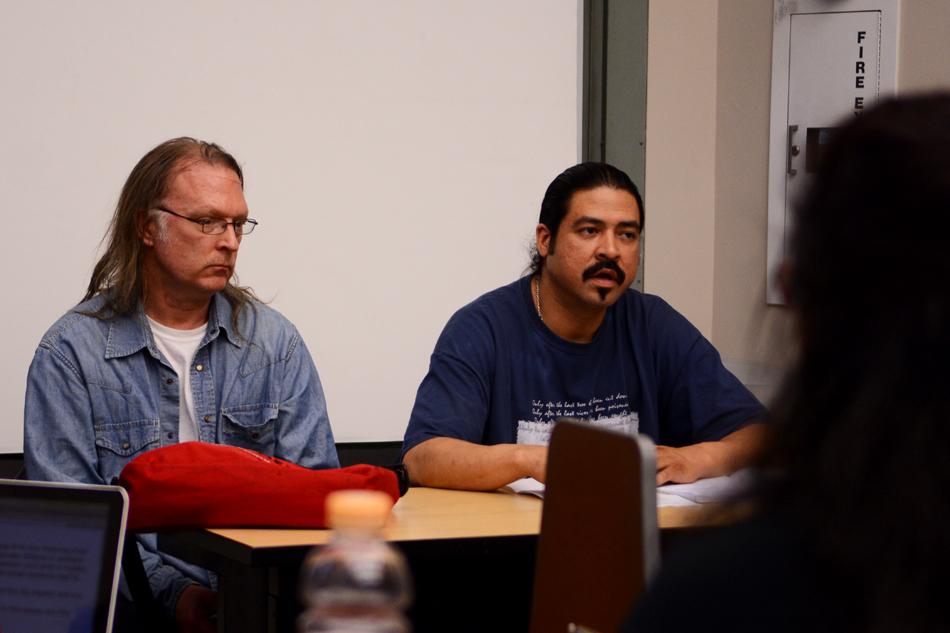Northwestern employees, students discuss workers’ rights as part of Social Justice Week
Nathan Richards/Daily Senior Staffer
Tom Breitsprecher, a cook at the Willard Residential College dining hall, and Rafael Marquez, a food service worker in 1835 Hinman dining hall, discuss their personal experiences as campus workers at an event held Tuesday as part of Social Justice Week. At the end of the event, a petition supporting campus workers was announced.
May 14, 2014
Northwestern workers and students spoke Tuesday night about the increasingly corporate culture of universities like NU and announced a petition supporting the rights of campus workers.
The talk, “$$$: Workers’ Rights & Neoliberalism at the University,” was held in University Halland sponsored by Peace Project, NU’s oldest social justice and anti-war organization, as a part of Social Justice Week at NU: Oppression at the Academy.
(Social Justice Coalition plans second ‘Justice’ week)
Two Northwestern employees, Rafael Marquez and Tom Breitsprecher, kicked off the discussion by sharing their personal experiences as campus workers.
On April 16, Marquez, a food service worker in 1835 Hinman dining hall, said he attended an afternoon meeting with other workers and members of Sodexo management. After an employee was called out at the meeting for working too slowly, Marquez defended her, and members of Sodexo management subsequently threatened to call campus police, Marquez said. He said he was accused of being “overexcited” and “under the influence” at the workplace and was then put on temporary suspension. In an effort to maintain his job, he was required to turn in statements to the Sodexo Human Resources Office.
“As my duty as a steward, I will not back down or shut up when it comes to defending one of my coworkers when something unjust is put upon them,” Marquez said. “If I don’t stick up for my coworker, it’s like we don’t have a right to freedom of speech.”
Marquez said a week before his accusations, a fellow employee had been laid off but was not replaced. Instead, the former employee’s responsibilities were allocated to other workers, he said.
Students in support of Marquez organized a march from the Arch to the Sodexo Human Resources Office where he turned in his statements. During the suspension, he said he was also called into the office and “interrogated.”
(Students organizer march to support Sodexo workers)
Marquez said support and solidarity from students is key in changing the way Sodexo and the University engage with workers’ issues.
Breitsprecher, a cook at the Willard Residential College dining hall, said even though there is a union, there are often incidents in which workers are unfairly treated and not represented equally by campus management and the University.
“Although this was a single incident, we deal with managers all the time who threaten, intimidate and bully workers,” Breitsprecher said. “That’s coercion, and often we’re powerless to stop it.”
The discussion continued with Jackson Bartlett, a doctoral student in the Department of African American Studies, who discussed neoliberalism and corporate culture on college campuses. Essentially, Bartlett said neoliberalism is defined as the emphasis on individual accountability as being necessary for success. He added that it is important for those in higher education to be able to critically analyze and empathize.
“The unavoidable fact is that most students here have had little experience with working class communities,” Bartlett said. “We should be teaching about these struggles in the classroom.”
Communication senior Isabella Pasbakhsh echoed Bartlett’s statements, saying the switch from structural and social responsibility to individual responsibility is a product of “corporations setting agendas and deciding what the University does.”
“Self-interest is the ultimate interest,” she said. “It’s the idea that if you aren’t able to manage academics, student groups and work study, it’s on you for not succeeding.”
At the end of the talk, Weinberg sophomore Hazim Abdullah-Smith, treasurer of Peace Project and a member of the organizing committee for Social Justice Week, announced the petition, which lends support to NU workers, and encouraged attendees to sign it.
“We implore Northwestern University to ensure Sodexo workers (and workers of other corporations under contract by NU) are respected and able to return to their full-time positions,” the petition reads.
Abdullah-Smith said the event was held because “there are a lot of things going on here that require awareness and compassion,” including the workers’ rights issues.
“This event was important in order to call attention to the everyday injustices we may overlook and come to understand that things may not be as simple as they appear,” he said.
Email: oliviaexstrum2017@u.northwestern.edu
Twitter: @olivesocean


